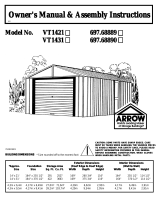
Fitting Instructions
Fitting InstructionsFitting Instructions
Fitting Instructions
For 945
For 945For 945
For 9456
66
6
& 946
& 946& 946
& 9466
66
6.
..
.
9456 & 9466.
FI9451 (50690/AG) Issue6 – 04/22
T: 020 7387 9951 2 www.allgood.co.uk
ALLGOOD PLC
63-83 BREARLEY STREET,
BIRMINGHAM
Fit to template FT9456.
Once the door closer has been installed and adjusted no further
maintenance should be necessary. However, an annual check should
ensure that:
• The door leaf closes freely and positively into its frame from any angle
without slamming.
• Excessive force is not required by the user to open the door.
• All fixings are tight.
• The hexagon bolt is tight.
Testing (before power is supplied)
• Open the door leaf to its maximum opening angle and release. The door
leaf should close fully into the door fame and overcome the latch.
• Open the door leaf and rest the latch bolt on the striker plate.
Release the door leaf. The door closer should have sufficient power to latch
the door leaf closed.
Any failure to close the door into the frame should be investigated.
It may indicate that the door closer is undersized or that excessive force is
required to close the door due to distortion or misalignment.
Warning
This door closer contains a powerful spring which
Is inserted into the body under pressure.
Under no circumstances should attempts be
made to dismantle a door closer!
Testing (when power is supplied)
• Open the door leaf to at least 80° and ensure that the door hold open.
• Gently pull the door to check that the door can be manually
pulled off hold.
• Open the door leaf to the hold positon i.e. greater than 80° and test the
release by pressing the black button which is located between the LEDs
or by other emergency power shut down mechanism.
Certifire Conditions of use Reference CF104
This approval relates to the use of the door closer model with the following
door assemblies:
a. Latched and unlatched, intumescent sealed door assemblies consisting
of timber faced and edged leaves with timber, cellulosic or mineral cores in
timber frames and having fire resistances of between 20 minutes and 120
minutes (Code ITT)
b. Latched and unlatched, intumescent sealed door assemblies consisting of
timber faces and edges leaves with timber, cellulosic or mineral cores in
metal frames and having fire resistances of up to 30 minutes (Code ITM30)
Closer adjustment
Latch Speed – outer control
“Off” as drawn.
Rotate ½ a turn towards
‘latch’ to turn “on”.
Latch Speed – inner control
Rotate clockwise to reduce
closing speed (Do not open valve
past leading edge of outer ring).
Power Supply
Electro-magnetic door closers can have power supplied by the:
9471 armoured lip or 8066T2/8066T8 power transfer hinge.
• The loop slots into the power conditioning module.
• The block should be fixed to the door frame and then
connect to an appropriate 24V DC power supply.
Size 3, suitable for doors up to 950mm wide and 60kg.

